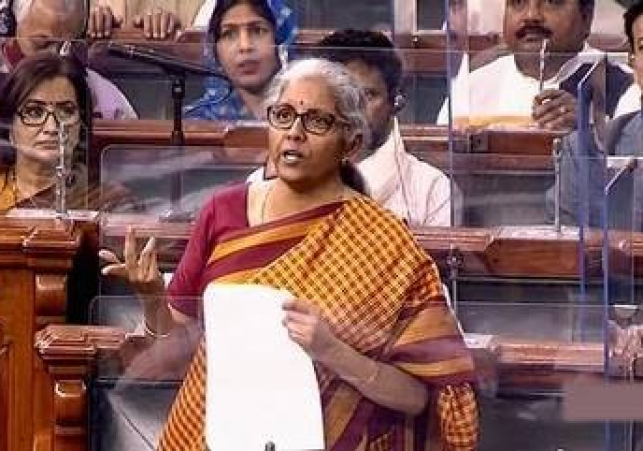

In her response to the Lok Sabha debate on the Union Budget for 2022-23, Union Finance Minister Nirmala Sitharaman compared the UPA’s mismanagement of the economy following the global financial crisis of 2008 to the government’s deft handling of the ‘once in a century’ situation created by the COVID-19 pandemic.
Ms. Sitharaman responded to Opposition jibes regarding the next 25 years of Amrit Kaal, as described in the Budget, running up to India’s 100th year of independence, by saying that the ‘Andh Kaal’ (period of darkness) referred to by a member actually occurred because of the Congress.
In 1991, the country’s foreign exchange reserves were only good for two weeks. Inflation in the double digits during the UPA-1, and especially the UPA-2, was truly Andh Kaal. “Andh Kaal” was the third, according to the minister. “The coal scam, the daily headlines of corruption, the 2G scam, middlemen all over, that was Andh Kaal.”
And, because they don’t know how to cope with the country after the global financial crisis, and India has become a fragile five economy with policy paralysis, the Opposition member refers to the circumstance they created as Andh Kaal,” she claims.
She pointed out that while real GDP growth slowed to 3.1 percent in 2008-09 due to the global financial crisis, the pandemic effect resulted in a 6.6% decline in 2020-21, with GDP losses of 2.12 lakh crore and 9.577 lakh crore, respectively.
Despite supply disruptions, India’s CPI (Consumer Price Index) inflation in 2020-21 was 6.2% , down from 9.1% in 2008-09. Consider the magnitude and breadth of the Indian economy’s contraction. What does this imply? Today, despite the intense crisis, the CPI is well-contained and is only 6.2% showing that we managed the economy much better now,” she argued.
Stressing that many MPs had raised wild allegations about the economy and thrown several questions about inflation worries, Ms. Sitharaman noted that some of those members were not in the House to hear her response.
Despite a 2.3% current account deficit in 2008-09 due to the pandemic, India produced a 0.9% surplus in 2020-21, with foreign reserves rising from $250 billion in 2008-09 to roughly $650 billion. “FDI inflows were $8.3 billion, but they’ve increased to $80.3 billion under our watch,” she said.
Ms. Sitharaman responded to members who questioned the Budget’s claim that just 60 lakh jobs will be created over the next five years by saying the amount was solely for the Production Linked Incentives schemes, which are not the only programme that creates jobs.
The first principle is — employment generation would be a natural outcome of… in general, when we are talking of high growth, and investment in infrastructure, these are not going to happen without jobs. The urban unemployment rate of January to March 2021-2022 had declined to pre-pandemic levels after peaking in 2020. In November 2021, we saw a net addition in the EPFO subscription peak at 13.9 lakh new members, 109% over the previous year and the highest since 2017,” she said.
While recounting the measures taken to help micro, small and medium enterprises (MSMEs), Ms. Sitharaman also quelled concerns, especially in Kerala, about the higher import duties on umbrellas.
Ms. Sitharaman addressed concerns about higher import taxes on umbrellas, particularly in Kerala, while detailing the actions taken to assist micro, small, and medium enterprises (MSMEs).
“Every year, 25 million umbrellas arrive in this country from only one country, and you know which country it is.” Prior to the Budget, they were subject to a 10% basic customs charge, whereas parts were only subject to a 5% levy. She stated, “We had a number of representations, particularly from MSME groups who questioned, ‘Shouldn’t we be protected under AtmaNirbhar Bharat?’”
“How painful is it to do this?” Everyone uses umbrellas, thus it isn’t a problem for any one country. “Even this drew a lot of attention,” the minister said.
Concerns over BSNL’s health were addressed by the Finance Minister, who stated that the public sector institution was placed in the Intensive Care Unit (ICU) owing to carelessness by the previous administration, and that the current administration is correcting course.
“BSNL was established in 2000, however there was an agreement in place at the time that the annual license cost would be reimbursed until 2010, but the UPA ceased paying the payment in 2006.” Because of Congress, the BSNL was in the ICU,” she remarked, emphasizing that ‘crocodile tears’ are now being shed for the firm.
“In 2010, MTNL was notified that it would have to pay the prices established by the spectrum auction for broadband wireless connectivity, so a cash-rich firm had to spend 11,000 crore and change.”